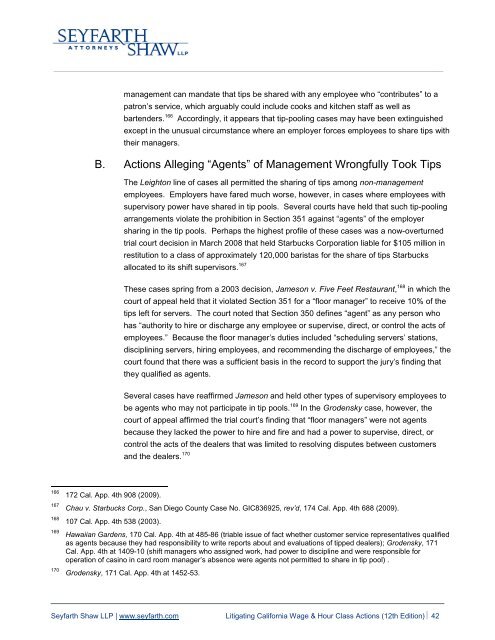Litigating California Wage & Hour and Labor Code Class Actions
Litigating California Wage & Hour and Labor Code Class Actions
Litigating California Wage & Hour and Labor Code Class Actions
You also want an ePaper? Increase the reach of your titles
YUMPU automatically turns print PDFs into web optimized ePapers that Google loves.
management can m<strong>and</strong>ate that tips be shared with any employee who “contributes” to a<br />
patron’s service, which arguably could include cooks <strong>and</strong> kitchen staff as well as<br />
bartenders. 166 Accordingly, it appears that tip-pooling cases may have been extinguished<br />
except in the unusual circumstance where an employer forces employees to share tips with<br />
their managers.<br />
B. <strong>Actions</strong> Alleging “Agents” of Management Wrongfully Took Tips<br />
The Leighton line of cases all permitted the sharing of tips among non-management<br />
employees. Employers have fared much worse, however, in cases where employees with<br />
supervisory power have shared in tip pools. Several courts have held that such tip-pooling<br />
arrangements violate the prohibition in Section 351 against “agents” of the employer<br />
sharing in the tip pools. Perhaps the highest profile of these cases was a now-overturned<br />
trial court decision in March 2008 that held Starbucks Corporation liable for $105 million in<br />
restitution to a class of approximately 120,000 baristas for the share of tips Starbucks<br />
allocated to its shift supervisors. 167<br />
These cases spring from a 2003 decision, Jameson v. Five Feet Restaurant, 168 in which the<br />
court of appeal held that it violated Section 351 for a “floor manager” to receive 10% of the<br />
tips left for servers. The court noted that Section 350 defines “agent” as any person who<br />
has “authority to hire or discharge any employee or supervise, direct, or control the acts of<br />
employees.” Because the floor manager’s duties included “scheduling servers’ stations,<br />
disciplining servers, hiring employees, <strong>and</strong> recommending the discharge of employees,” the<br />
court found that there was a sufficient basis in the record to support the jury’s finding that<br />
they qualified as agents.<br />
Several cases have reaffirmed Jameson <strong>and</strong> held other types of supervisory employees to<br />
be agents who may not participate in tip pools. 169 In the Grodensky case, however, the<br />
court of appeal affirmed the trial court’s finding that “floor managers” were not agents<br />
because they lacked the power to hire <strong>and</strong> fire <strong>and</strong> had a power to supervise, direct, or<br />
control the acts of the dealers that was limited to resolving disputes between customers<br />
<strong>and</strong> the dealers. 170<br />
166<br />
167<br />
168<br />
169<br />
170<br />
172 Cal. App. 4th 908 (2009).<br />
Chau v. Starbucks Corp., San Diego County Case No. GIC836925, rev’d, 174 Cal. App. 4th 688 (2009).<br />
107 Cal. App. 4th 538 (2003).<br />
Hawaiian Gardens, 170 Cal. App. 4th at 485-86 (triable issue of fact whether customer service representatives qualified<br />
as agents because they had responsibility to write reports about <strong>and</strong> evaluations of tipped dealers); Grodensky, 171<br />
Cal. App. 4th at 1409-10 (shift managers who assigned work, had power to discipline <strong>and</strong> were responsible for<br />
operation of casino in card room manager’s absence were agents not permitted to share in tip pool) .<br />
Grodensky, 171 Cal. App. 4th at 1452-53.<br />
Seyfarth Shaw LLP | www.seyfarth.com <strong>Litigating</strong> <strong>California</strong> <strong>Wage</strong> & <strong>Hour</strong> <strong>Class</strong> <strong>Actions</strong> (12th Edition) 42
















